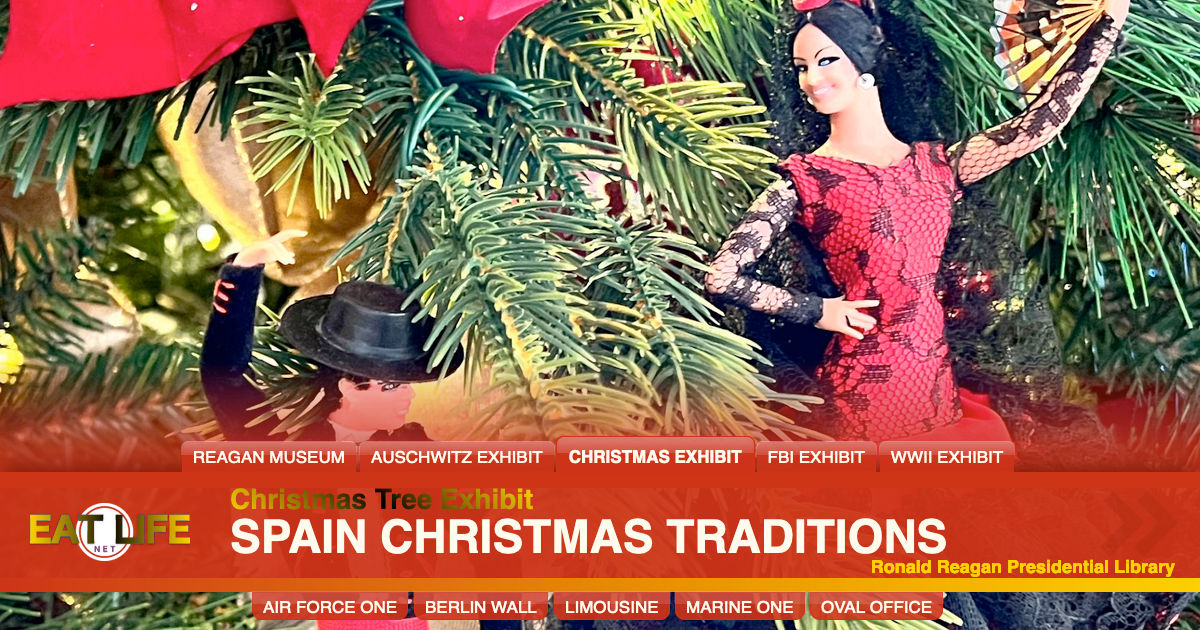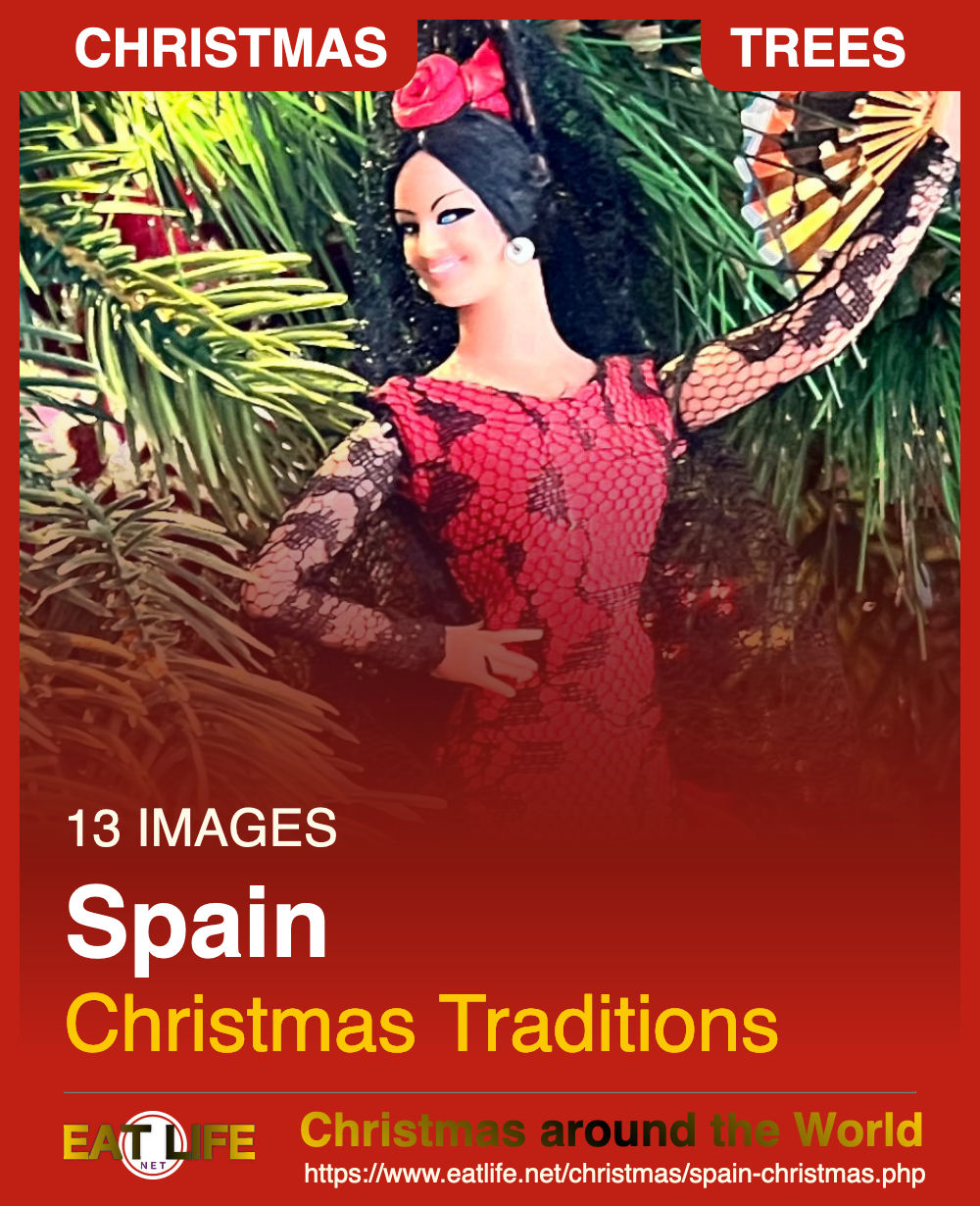SPANISH CHRISTMAS

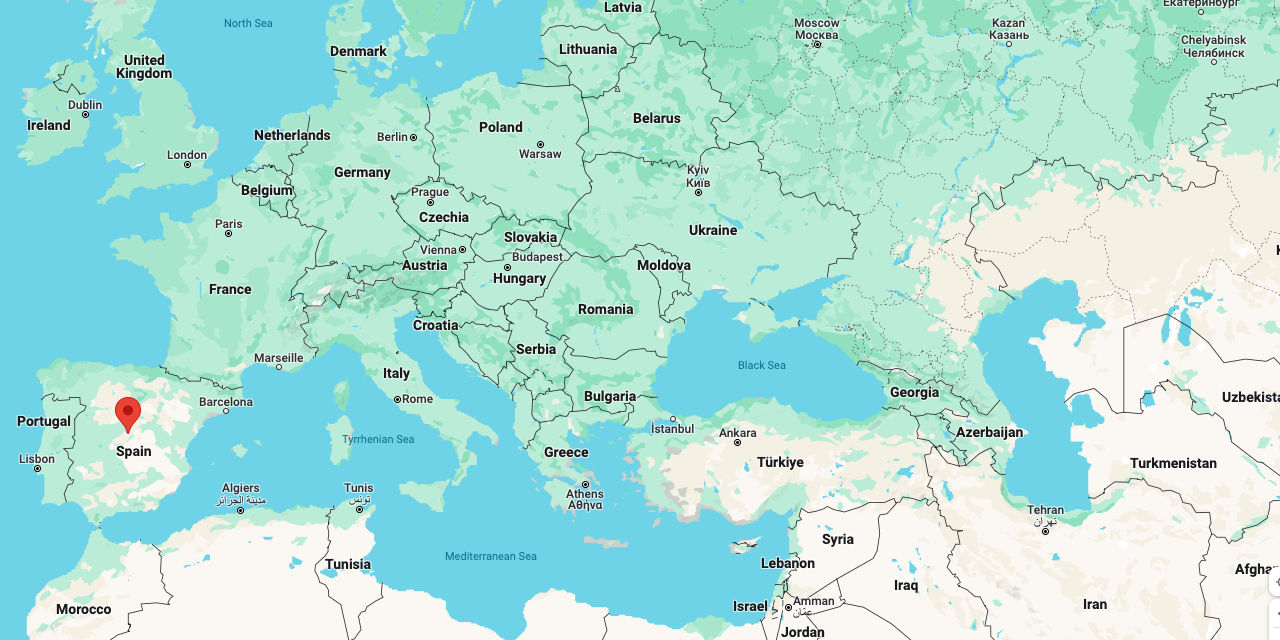
https://www.google.com/maps/place/Madrid,+Spain

| HOW TO SAY MERRY CHRISTMAS: | |
|---|---|
| In Spanish | Feliz Navidad |

Trip SavvySpain
Christmas in Spain is quite a treat. There are celebrations and religious services from mid-December through Jan. 6. There is the giant multi-billion euro lottery, splendid nativity scenes, lots of great food, and one of the biggest New Year's Eve celebrations you are likely to see.As early as October, traditional sweets such as marzipan and turron, an almond and honey confection, appear in supermarkets. But the actual events start in December.
The weather in Spain is chillier than you might expect, but December is a festive time to visit Spain.
Noteworthy Spanish Winter Holidays
- Dec. 8: Inmaculada is the religious celebration that signals the beginning of the Christmas season. The name refers to the Immaculate Conception of the Virgin Mary and is an especially popular celebration in Seville. Inmaculada is the Patron Saint of Seville, where musical groups from the university, known as tunas, gather around the statue of the Virgin Immaculada in the Plaza del Triunfo (behind the cathedral) in traditional dress and sing songs. On the morning of December 8, children dance the Danza de Los Seises (Dance of the Sixes), a custom originating in the 16th century, in the square.
- Dec. 12: Nochevieja Universitaria (University New Year's Eve) is celebrated in Salamanca. Since all the students are away from their friends for Christmas and New Year's, they gather together in Plaza Mayor for an early New Year's celebration.
- Dec. 13: El Dia de Santa Lucia, the patron saint of the blind, is celebrated. Traditionally the blind would sing Christmas carols in the streets, although this is less common now. In the village of Zujar near Granada, bonfires are lit to celebrate the event. The Santa Lucia festival is a major Scandinavian festival, so where there is a high concentration of Scandinavian ex-pats, such as in Majorca and the Canary Islands, several days of festivities often focus on Santa Lucia.
- Dec. 22: The Christmas Lottery takes place. "El Gordo" ("the fat one") is the biggest lottery in the world as well as one of the oldest, having started in 1812. All of Spain stops for the big draw on Dec. 22, and the lottery, which tends to be played by groups as the price of tickets is so high, has turned around the fortunes of whole villages.
- Dec. 24: Christmas Eve (Nochebuena in Spanish).
- Dec. 25: Christmas Day (Navidad in Spanish).
- Dec. 31: New Year's Eve (Nochevieja in Spanish).
- Jan. 1: New Year's Day (Ano Nuevo in Spanish).
- Jan. 6: Three Kings Day, or Dia De Los Reyes in Spanish, is the day the children of Spain receive presents.



WHYCHRISTMAS.COMChristmas in Spain
Most people in Spain go to Midnight Mass or 'La Misa Del Gallo' (The Mass of the Rooster). It is called this because a rooster is supposed to have crowed the night that Jesus was born. Christmas Eve is known as Nochebuena. In the days before Nochebuena, children might take part in 'piden el aguinaldo' where they go and sing carols around their neighbors hoping to get some money!Most families eat their main Christmas meal on Christmas Eve before the service. The traditional Spanish Christmas dinner was 'Pavo Trufado de Navidad' which is Turkey stuffed with truffles (the mushrooms, not the chocolate ones!) or 'Pularda asada' (a roasted young hen), although they are not commonly eaten now. In Galicia (a region in north-west Spain, surrounded by water) the most popular meal for Christmas Eve and for Christmas Day is seafood. This can be all kinds of different seafood, from shellfish and mollusks, to lobster and small edible crabs.
Popular desserts and sweets include 'mazapan' (made of almonds, sugar and eggs), 'turron' (made of honey and toasted almonds) and 'polvorones' (made of flour, butter and sugar).
After the midnight service, one old tradition was for people to walk through the streets carrying torches, playing guitars and beating on tambourines and drums. One Spanish saying is 'Esta noche es Noche-Buena, Y no Es noche de dormir' which means 'Tonight is the good night and it is not meant for sleeping!'
MERRY CHRISTMAS A few different languages are spoken in different regions in Spain.
- In Spanish (also sometimes called Castilian) Happy/Merry Christmas is Feliz Navidad
- In Catalan, Asturian, and Occitan it's Bon Nadal
- In Galician it's Bo Nadal
- In Aragonese it's Feliz Nadal
- In Basque (or Euskara in Basque) it's Eguberri On
December 28th is 'Dia de los santos inocentes' or 'Day of the Innocent Saints' and is very like April Fools Day in the UK and USA. People try to trick each other into believing silly stories and jokes. Newspapers and TV stations also run silly stories. If you trick someone, you can call them 'Inocente, inocente' which means 'innocent, innocent'. 28th December is when people all over the world remember the babies that were killed on the orders of King Herod when he was trying to kill the baby Jesus.
New Year's Eve is called 'Nochevieja' or 'The Old Night' in Spain and one special tradition is that you eat 12 grapes with the 12 strokes of the clock at Midnight! Each grape represents a month of the coming year, so if you eat the twelve grapes, you are said to be lucky in the new year.
Apart from Christmas, there is another festival that is celebrated in Spain that is about the Christmas Story. It is called Epiphany and is celebrated on 6th January. In Spanish, Epiphany is called 'Fiesta de Los tres Reyes Magos': in English this means 'The festival of the three Magic Kings'. Epiphany celebrates when the Kings or Wise men brought gifts to the baby Jesus.
Children have some presents on Christmas Day, but most are opened at Epiphany. Children believe that the Kings bring presents to them at Epiphany. They write letters to the Kings asking for toys and presents. And on Epiphany Eve (January 5th) they leave shoes on windowsills or balconies or under the Christmas Tree to be filled with presents. Gifts are often left by children for the Kings, a glass of Cognac for each King, a satsuma and some walnuts. Sometimes a bucket of water is left for the camels that bring the Kings! If the children have been bad, the Kings might leave pieces of coal made out of sugar in the presents!
Some big towns and cities have Epiphany Parades with each King having a big float that is shaped like a camel. Sometimes there are also real camels in the parade. Often the Kings (Wise Men) throw out candy to the children watching the parade. The Three Kings in the Spanish Epiphany are:
- Gaspar, who has brown hair and a brown beard (or no beard!) and wears a green cloak and a gold crown with green jewels on it. He is the King of Sheba. Gaspar represents the Frankincense brought to Jesus. Frankincense is sometimes used in worship in Churches and showed that people worship Jesus.
- Melchior, who has long white hair and a white beard and wears a gold cloak. He is the King of Arabia. Melchior represents the Gold brought to Jesus. Gold is associated with Kings and Christians believe that Jesus is the King of Kings.
- Balthazar, who has black skin and a black beard (or no beard!) and wears a purple cloak. He is the King of Tarsus/Macedonia and Egypt. Balthazar represents the gift of Myrrh that was brought to Jesus. Myrrh is a perfume that is put on dead bodies to make them smell nice; Christians believe that it showed that Jesus would suffer and die.
Christmas in the Basque Country
In the Basque country (which is a part of northern Spain and southern France), on Christmas Eve, children's presents are delivered by a magical man called Olentzero. He's a big, overweight man wearing a beret and smoking a pipe. He dresses like a Basque farmer.Christmas in Catalonia
In the Catalonia region of Spain there's a Christmas character called 'Tio de Nadal' (the Christmas log) or he's sometimes known as 'Caga tio' (the pooping log!). It's a small hollow log propped up on two legs with a smiling face painted on one end. From the 8th December (the Feast of the Immaculate Conception) Catalan families give the log a few morsels of food to 'eat' and a blanket to keep it warm. On Christmas Day or Christmas Eve, the log then 'gives out' small gifts! People sing a special song and hit the log with sticks to help its 'digestion' and the log drops sweets, nuts, and dried fruits. When garlic or an onion falls out of the log, all of the treats are finished for the year. The Caga tio is also found in many home is the Aragon region where it's known as 'Tizon de Nadal'.Nativity Scenes 'Pesebres' are also popular in Catalonia (and all throughout Spain!). Many towns also hold 'Pastorets' which are big plays/presentations about the Christmas story, the birth of Jesus. They have lots of music and readings from the Bible. You can find out more about Pastorets on the Pastoret Society of Catalunya's website (goes to another site).
An unusual figure which is popular and traditional in Pesebres in Catalonia is 'El Caganer' which means 'the poo-er'! And yes, it's a figure of a person going to the toilet! It's normally a figure of a Catalan peasant, wearing the traditional red Catalan cap (called a barretina) squatting with their trousers/pants down and well, you know... New versions of El Caganer are now produced each year, often with the faces of celebrities and politicians! This figure has been part of nativity scenes in Catalonia since the early 18th century. It's often hidden in a back corner of the Pesebre, well away from the stable! Similar figures can also sometimes be found in scenes in other areas in Spain such as Andorra, Valencia and Murcia; in Northern Catalonia (in southern France), Naples (in Italy) and some parts of Portugal.
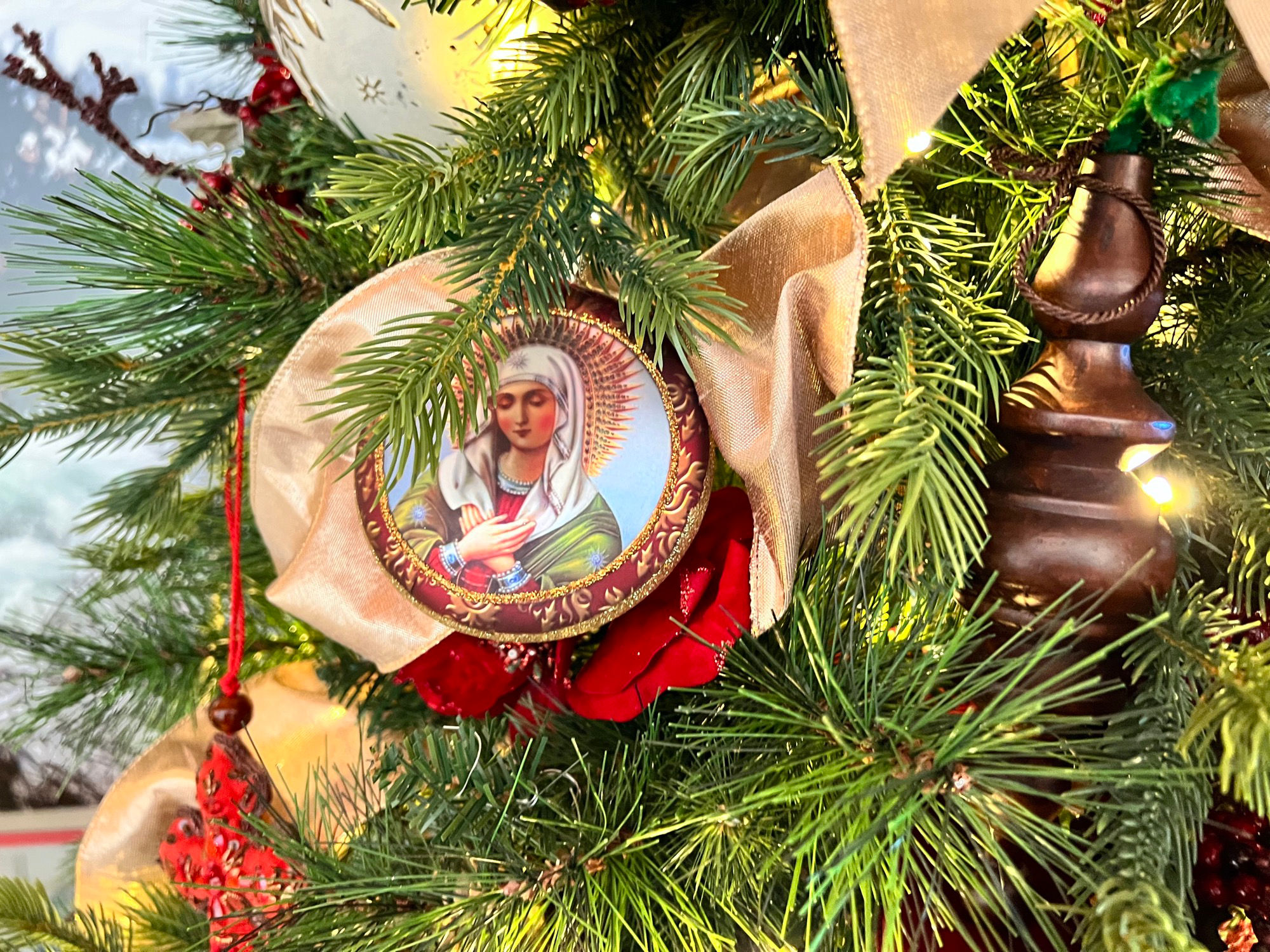


CULTURE TRIPChristmas in Spain
Christmas is a big deal here in Spain, where it's seen first and foremost as a time for family gatherings and old friends. Aside from the major religious celebrations, there are a number of regional festivities and traditions to look forward to as well. If you don't want to miss out on anything over the holiday season, read our guide to celebrating Christmas in Spain like a true local.The Christmas season properly kicks off on December 8 in Spain, with the Feast of the Immaculate Conception. This day is a religious celebration, and many Catholics here attend church to mark the occasion. While there's not much going on in terms of public celebrations on that day, it does very much signify the beginning of the festive season.
From then onwards, nativity scenes, Christmas lights, and all other kinds of holiday traditions commence in the build up to December 24th. Although not directly associated with Christmas, you may want to consider buying a ticket for the Christmas lottery, nicknamed El Gordo (the Fat One) in reference to the big prize. About three out of every four Spaniards enter the lottery, which is believed to be the largest in the world. The winners are drawn on December 22nd every year, and the total prize money available is upwards of €2 billion each year.
There are Christmas markets organized in all big towns and cities in Spain, and they tend to have remained quite traditional. Most markets sell a mixture of decorations, gifts, and usually Christmas trees too. Building your own nativity scene at home is also a popular Christmas tradition, and markets usually sell everything you need from miniature figurines to moss and straw for the manger.
Food plays an important part in Spanish culture any time of the year, but around Christmas, there are certain dishes and ingredients which are even more important. While nut season may be coming to an end, you'll find that the stores fill up with the nut-based treat known as turron. Made with honey and eggs, this seasonal treat is everywhere at Christmas, and any excuse for a little bit of turron here and there is a good one.
Another favorite Christmas time treat is the polvorones and mantecados, a type of shortbread made using pork fat instead of butter and sold in a variety of different flavors: cinnamon, nut, citrus, etc.
Of course, the iconic Spanish cured ham jamon Iberico features heavily on the Christmas menu too, but now is the time to splash out on the more expensive kinds. Look for the mention of bellota, which means the ham was fed on acorns, giving it a distinctive nutty flavor, making it all the more mouthwatering.
This is the time of the year when seafood is also particularly appreciated, and there will be plenty to choose from at the market. Upgrade your regular prawns for Palamos prawns (from the port of Palamos in Catalonia) for extra approval, and try something a little different like the tiny tallarines or even razor clams.
Celebrating Christmas and the Three Kings
While Christmas Day is the celebration of the birth of Jesus, it is not the day for presents and gifts (unlike in the UK or North America). Instead, the 24th and 25th are days for feasting with family and close friends and also partaking in mass and religious celebrations. Many shops and businesses close early on the 24th, so be sure to give your season's greetings before lunchtime. The 24th is also a great time to wander through the local market to witness the Christmas cheer in full swing.In certain parts of Spain, December 26th is also a bank holiday known as Saint Stephen's Day. In Catalonia, it is traditional for the family to gather once again on this day and eat cannelloni pasta stuffed with the leftover meats from the previous days' celebrations.
For children, though, the most exciting part of Christmas is undoubtedly January 6th, known as the Epiphany, or Day of The Three Kings. This is a religious celebration of the arrival of the three Wise Men to visit baby Jesus, and it is customary for gifts to be given to children on that day in homage to the gifts brought by the Kings. In most towns and cities across Spain, a large parade is organized welcoming the arrival of the Kings, and children gather to greet them as they throw sweets and treats to those present. It's also customary during this time to eat a special pastry known as Roscon de Reyes, a circular pastry filled with cream and covered with colorful candied fruit.

WORLD HOLIDAY TRADITIONSHoliday Traditions of Spain
In Spain, the Christmas holiday season is full of the usual Christmas festivities, but there is one tradition, not at all common elsewhere. Named "Hogueras" (bonfires), this tradition originated long before Christmas itself. It is the observance of the winter solstice, the shortest day of the year and the beginning of winter. It is characterized by people jumping over fires as a symbolic protection against illness. This fire-jumping can be seen primarily in Granada and Jaen.The more common traditions include incredibly elaborate "Nacimiento" (nativity scenes), Christmas trees, and remarkable Christmas markets scattered among villages and cities with piles of fruits, flowers, marzipan and other sweets, candles, decorations and hand-made Christmas gifts. Often, as the Christmas Eve stars appear in the heavens, tiny oil lamps are lighted, warming village windows. The crowds at the Christmas market thin as shoppers return to prepare for the coming meal. The Christmas Eve gaiety is interrupted at midnight be the ringing of bells calling the families to "La Misa Del Gallo" (The Mass of the Rooster). The most beautiful of these candlelight services is held at the monastery of Montserrat, high in the mountain near Barcelona, which is highlighted by a boy's choir describes as performing the Mass in "one pure voice."
Christmas dinner is never eaten until after midnight. It is a family feast, and often highlighted with "Pavo Trufado de Navidad" (Christmas turkey with truffles; truffles are a mushroom-like delicacy found underground). After the meal, family members gather around the Christmas tree and sing Christmas carols and hymns of Christendom. The rejoicing continues through the wee hours of the morning. An old Spanish verse says...
"Esta noche es Noche-Buena, Y no es noche de dormir"
(This is the goodnight, therefore it is not meant for sleep.)Christmas Day is spent at church, at feasts and in more merry-making. A custom peculiar to Spain is that of "swinging." Sings are set up throughout the courtyards and young people swing to the accompaniment of songs and laughter.
It is not Santa who comes to Spain bearing gifts, but the Three Wise Men. The Spanish Christmas continues for a few weeks after Dec. 25th. On the Eve of Epiphany, January 5th, children place their shoes on the doorstep, and in the secret of the night, the Three Wise Men pass leaving gifts. January 6th, Epiphany is heralded with parades in various cities where candy and cakes are distributed to throngs of children.
OF SPECIAL NOTE...
The three Wise men are seen everywhere in Spain at Christmas, visiting hospitals, orphanages, etc. The men who dress up in various "Wise men" garments are from all walks of life. The legend tells of the three Wise men traveling through the country on their way to Bethlehem. To properly receive them, the children fill their shoes with straw on Epiphany Eve. For their efforts, they find their shoes filled with presents the following (Epiphany) morning. Spanish children have a great fondness for the three Wise men, especially Balthazar.

HOW STUFF WORKSChristmas Traditions in Spain
The Christmas season begins in Spain on December 8, with a weeklong observance of the Feast of the Immaculate Conception. Spanish families may travel to Seville, in the southwest, where the warm weather encourages flowers to bloom in December. In Seville's great cathedral, they watch ten costumed boys perform an ancient dance called Los Seises to honor the Virgin Mary, the patron saint of Spain. In northern Spain, families decorate their balconies with colorful carpets, flags, and flowers. They burn candles all night in the windows.Evergreens decorate the churches and outdoor markets throughout the Christmas season. Tambourines, gourd rattles, castanets, and miniature guitars are offered for sale to enliven the singing and dancing in the streets. Children go from house to house reciting verses or singing carols for sweets, toys, or small instruments.
Life-size nativity scenes called nacimientos are set up in public places, and every family has a small nacimiento in the best room in the house. In some villages, families send their sons to bring in a Yule log. As the boys tug the log home, they stop at homes along the way for chocolates and nuts.
Christmas Eve is La Noche Buena, the Blessed Night. When the first star shines in the evening sky, people light bonfires, called luminarias, in public squares and outside church walls. Traditional plays called Las Pastores depict the shepherds' adoration of the Christ Child in Bethlehem.
At home, each family places a burning candle above the door and lights candles around the nacimiento. People fast all day and then go as a family to midnight mass. Then they return home to enjoy a feast of almond soup, roasted meat, baked red cabbage, and sweet potato or pumpkin.
Christmas Day is set aside for family reunions, when relatives get together for more feasting. The children sing and dance around the nacimiento. Family members exchange gifts, and friends and neighbors exchange holiday sweets. Some families add to the fun with the traditional Urn of Fate. Names are written on cards and placed in a bowl. Then two names are drawn at a time. Those two people will be friendly to each other throughout the coming year.
Children believe that on Epiphany Eve, January 5, the Three Kings travel through Spain on their way to Bethlehem. That night children set out their shoes filled with straw for the Three Kings' camels. The Kings, passing in the night, fill the shoes with gifts. The next day, families enjoy a feast of almond soup, turkey, and roasted chestnuts. Sweets include a special nougat candy called turron and Kings' cake. A small prize baked in the cake brings luck to the person who finds it.
In some villages on Epiphany, January 6, children march out to the city gates carrying special cakes for the Three Kings and other foods for their servants and camels. They are hoping to meet the Three Kings on their way to the Holy Land. Always disappointed in their hopes, the children eat the good things they have brought with them. Then they are directed by their parents to the nacimiento in the village church. There they find the Three Kings presenting gifts to the Christ Child in a manger.
The Christmas season ends at Epiphany with the "Cavalcade of the Kings," a wonderful parade of the Three Kings and live animals.


Culture TripSpanish Christmas Traditions
The Spanish have a number of unique Christmas traditions that differ from those to which you might be accustomed. From giant nativity scenes to pooping logs, fools' day and the national lottery, here are eight Spanish Christmas traditions you should know.Belens
Belens are elaborate nativity scenes – it is the Spanish word for Bethlehem. More than just a stable with animals and figurines, however, the Spanish belens can be huge scenes, complete with many different houses, farms, rivers and marketplaces. The Spanish often set one of these up in their homes in the lead up to Christmas, but much larger ones are placed in shop windows or town squares.Midnight Mass
Many Spanish people go to Midnight Mass on Christmas Eve, known as La Misa Del Gallo (The Mass of the Rooster) to celebrate their faith. Often the main Christmas meal is eaten on Christmas Eve, just before or just after the mass.Caga Tio
A Christmas tradition unique to the Catalonia region is the Caga Tio, or pooping log. Essentially it is a piece of log, which has been dressed up with the addition of small wooden legs, a face, a blanket and a barretina (Catalan hat). Children keep the Caga Tio in their homes or schools in the run up to Christmas and feed it small pieces of bread or orange peeleach evening. Then, on Christmas Eve or Christmas Day, they hit the log with a stick, singing the special Caga Tio song, asking him to poo out lots of turron (a sweet nougat) and other sweets for them.El Gordo
The Spanish National Lottery is a big deal at Christmas time, and almost everyone plays it, making it the biggest lottery draw in the world. The Christmas Lottery is so big that it has been given the nickname 'El Gordo' or the 'Fat One', because of the huge amounts of cash you can win. Taking place on December 22, it has been held every year since 1812, and the winning numbers are sung out by school children.Dia de los Santos Inocentes
December 28, a few days after Christmas, is known as the Dia de los Santos Inocentes and is the Spanish version of April Fool's Day. This is the day for playing pranks, or dressing up in funny wigs and hats.The Three Kings
It's the Three Kings, or Reyes Magos (Melchior, Gaspar and Baltazar), who bring children their gifts in Spain, not Santa Claus (although he is becoming more popular now, too), and on January 6, not Christmas Day. On the night of January 5, the Kings parade through the towns across the country with their entourage of helpers, animals and elaborate floats, throwing sweets out for the children. When the kids return home, they leave out their shoes for the Kings to fill with presents overnight.The Basque Father Christmas
The Basques have their own version of Father Christmas or Santa Claus, in the form of Olentzero, a mythical giant, dressed in peasant's clothing and smoking a pipe. In Bilbao, on the night of December 23, Olentzero travels all the way down Gran Via towards the Arriaga Theatre, ready to bring gifts for children on Christmas Eve.Roscon de Reyes
Instead of Christmas cake or Christmas pudding, the Spaniards enjoy the Roscon de Reyes, usually on the Day of the Epiphany, on January 6. A sweet bread ring, it is topped with crushed almonds and candied fruits, and is sometimes stuffed with whipped cream. Sometimes a small figurine is hidden inside the bread, and the person who finds it has the honour of buying next year's roscon.

Reddit r/spainWhat is the Christmas celebration like in Spain, in terms of gift giving?
Our American middle school son is living with a family in Valencia, Spain for 6 months, including over Christmas. I was planning to send the family a few Christmas gifts. Do Spanish people celebrate Christmas the way we do in the US, with lots of gifts on Dec. 25? Or is it a more family-centered holiday with less emphasis on gifts? Should I send a gift even? Or am I supposed to send the gift for January 6th for the celebration having to do with the three kings? Any advice is much appreciated!
- Three Kings is the big gift day, but either way it will be well received. Unless you have something extremely specific in mind, you might strongly consider ordering the gift from within the EU (amazon.co.uk or amazon.es, for example) to avoid having your gifts get stuck in customs. If you send something of value from the US, it's extremely likely that your package will get taxed here in Spain and the family will have to pay a lot to get it out of customs.
- Traditionally, there isn't any gift giving on Christmas Day. Instead, the gifts are given on January 6th, Epiphany Day, on the account of this day commemorating the arrival of the Magi bringing the gifts of gold, frankincense and myrrh to the infant Jesus.
Instead, Christmas Eve and Christmas Day in Spain are more about celebrating together with the (extended) family, whereas by "celebrating", I'm afraid, we mean eating and drinking immoderately and then having intemperate arguments with the in-laws over politics or soccer...
Anyway, these days, gift-giving on Christmas Day is becoming more common, not least because with rising divorce rates (no doubt helped by those intemperate Christmas Eve arguments), it's becoming quite difficult for the children to receive all gifts from parents, step-parents and step-step-parents and grandparents in one single day...
- Traditionally it's Three Kings' Day, but with globalization comes more Santa stuff. We're a mixed family so we'll traditionally do a gift on the 25th and everything else on the 6th.
Though the 25th is becoming more popular, especially with families with children so the kids can enjoy their gifts through their time off of school
- It depends on the family, some give the presents on Dec 25 and others on January the 6th. others give presents on both days.
- Thank you all for educating me on this! Honestly, it sounds like in Spain, the entire "Christmas" holiday is long, varied, and really fun! Here in the US, it seems we just tear open presents for a single day, have a nice dinner, and call it quits on the holiday. Your posts make me jealous that our son is in Spain while we're here!
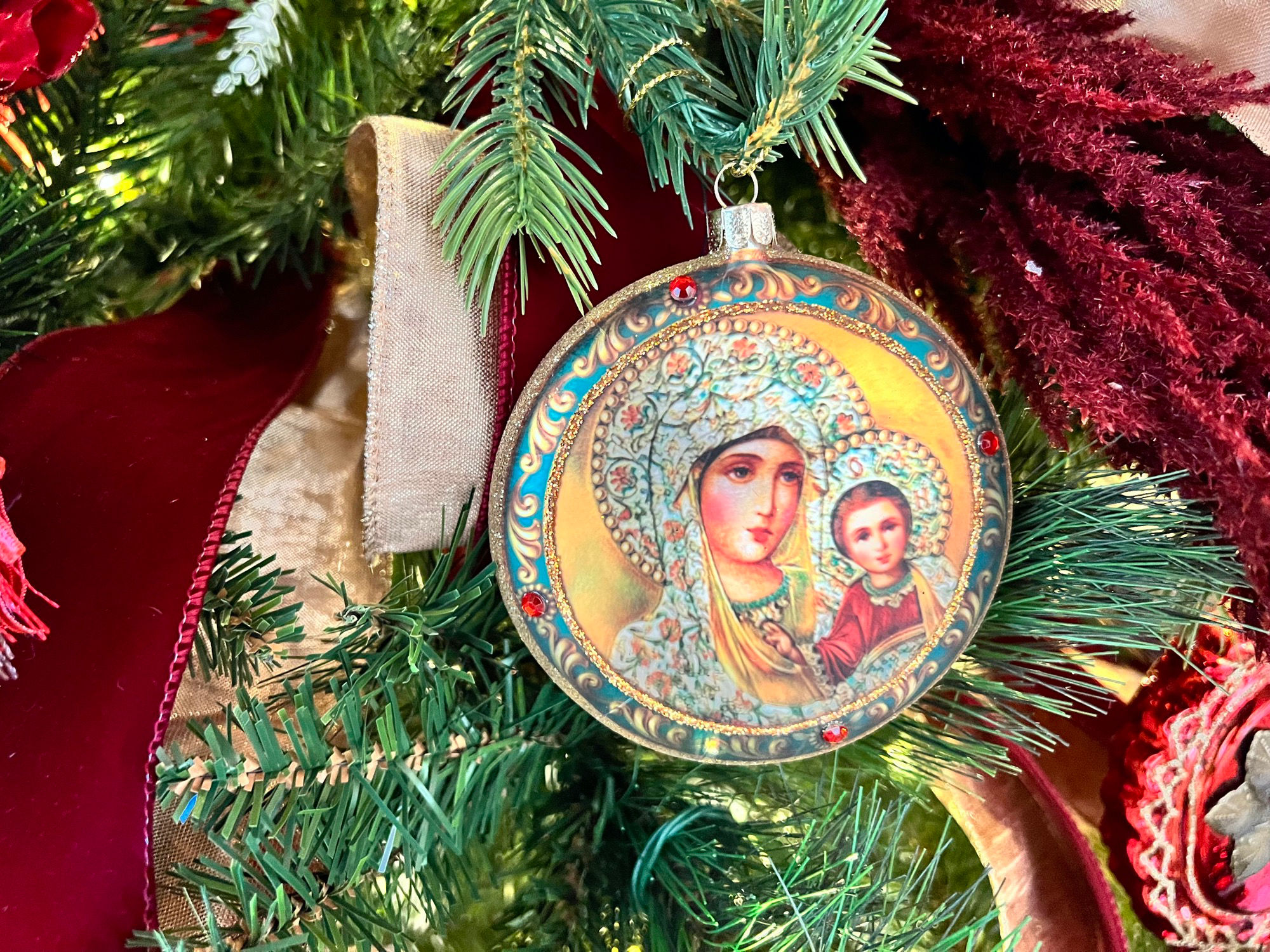
The Spanish are famous for their bizarre festivals. Here are just a few weird traditions you might come across at Christmas time in Spain.Caganer
A Catalonia specialty, the caganer is a little porcelain gnome-like figure with his trousers down who is seen defecating somewhere in the nativity scene. Children enjoy looking for the little guy, who is usually hidden among the more traditional items.Surprisingly, the caganer wasn't invented by the post-South Park generation: he's been offering his unique presents to the nativity scene since at least the middle of the 18th or 19th century, depending on who you believe. One thing's for sure: no Christmas market in Barcelona would be complete without a stall dedicated completely to these ornery figurines.
Caga Tio
Caga Tio is a log painted with a smiley face who is cared for from El Dia de Inmaculada (December 8) until Christmas. On Christmas Day or Christmas Eve (it varies), the children beat the log (and throw him into the fire) singing songs enticing it to "shit some presents."This quirky character is also particular to the region of Catalonia, which clearly didn't think that one scatological Christmas tradition was enough.
Multiple New Year's Eves
Rock band Wizard may well have wished it could be Christmas every day, but in Spain, it seems to be multiple New Year's Eve that they long for. They already have six occasions to celebrate it, with the earliest (or latest, depending on how you look at it) taking place in August! That honor belongs to the Andalusian town of Berchules, which shifted its celebration to the summer after an accidental power outage cut their actual NYE celebrations short. The party was so popular that they now repeat the New Year's Eve celebration every August.Red Underwear Running
In the village of La Font de la Figuera near Valencia, locals celebrate the arrival of a new year by stripping down to their underwear and running through the streets. One important point if you are going to join in next year: the underwear must be red.Day of the Innocents
The Day of the Innocents is Spain's version of April Fools Day, except it takes place on December 28. In days gone by, children used to go from door to door asking for sweets, much like on American Halloween. Bakers used to put salt in their cakes on this day to wind up the children.Most of this has now given way to more mundane activities, like sticking paper cut-outs to people's backs and other silly practical jokes.
Flour Throwing at the Els Enfarinats Festival
The Day of the Innocents goes that bit more absurd in the town of Ibi, Valencia, where the inhabitants throw flour at each other for reasons that may have been lost to the mists of time.Grape Eating at the Stroke of Midnight
If you're out in a public place in Spain on New Year's Eve, you will notice that everyone around you is carrying a handful of grapes. At the stroke of midnight, everyone will gobble them down: one for each gong of the bells. For each grape you get down, you will have a month's good luck in the coming year.

Christmas Presents - Regalos Tipicos
Spanish tradition has it that the Three Kings, los Reyes Magos, are the ones who on the morning of January 6th, el Dia de Reyes, bear presents for all the children, repeating the ritual they performed after baby Jesus was born. Influenced by American films and TV shows, some families have decided to switch to Papa Noel on Christmas Day, arguing that this allows the kids more time to play with their toys.Most Spanish people keep their fingers crossed for a Christmas windfall, courtesy of the world-renowned lottery draw, El Gordo, literally The Fat One. This is a long, drawn-out event that unfolds on the morning of December 22nd. Ticket numbers in a giant drum are matched to balls with millionaire prizes in a smaller drum. The ticketing system allows people to buy fractions and subfractions of different numbers, decimos and participaciones, with increasing chances of a share in the winnings.
As the top prizes come out, TV and radio coverage centres on the search for the many winners and for the particular lottery shop where the winning ticket was bought.
Food and Drink - Comidas y Bebidas
Christmas sweets are the main seasonal staple. El turron, nougat, is essential. This almond-based tablet traditionally comes in two versions, duro, hard, with whole almonds in a paste of sugar, honey and egg white, or blando, soft, where the ingredients are ground together.Las figuras de mazapan, marzipan figurines, are also popular, together with los polvorones, soft crumbly cakes made with lard, flour and cinammon.
The main meal takes place on Christmas Eve, la Nochebuena, and consists of a major dish of meat or seafood, such as cordero, lamb, bacalao, cod, or marisco, shellfish, which varies according to the region or the family's preferences.
The 'lucky grapes', las uvas de la suerte, are the law on New Year's Eve, la Nochevieja - literally 'Old Night'. A tradition introduced in the early 20th century, it's said to bring good luck if at each stroke of the bells at midnight you take one grape and make one wish, un deseo, for the New Year, el Ano Nuevo.
Quirky Customs - Curiosidades
Celebrations stretch from December 22nd, when the big lottery draw takes place, to January 6th, when the presents are unwrapped. Then, between Christmas Eve and New Year's Eve, there's still time to fit in another celebration. The equivalent of April's Fools Day takes place in Spain on December 28th, el dia de los Santos Inocentes, Holy Innocents' day.Nativity scenes with figurines are laid out on a table at home, with no limit to their degree of elaboration. Life-size figures are also on display in public squares and there are silent, living representations in public halls.
But in Cataluna there's a surprising addition to the crib: el caganer, which means, for want of a more offensive translation, the defecating shepherd. What's more, this scatological streak extends to a peculiarly-shaped local cake, la tifa, with sugar flies to top it all off!

Chef's PencilSpanish Christmas Foods
The arrival of Spanish Christmas is always preceded by a unique aroma. Weeks before these special dates, the smells and flavors of delicious Christmas fare, both sweet are savory are already in the air. Indeed, Christmas in Spain is a time to taste and enjoy unique dishes, to share food with friends and family and around the table.How many Christmas foods are there in Spain? The real answer would be thousands, since since each family, town and region has, over centuries of history, developed their own delicious creations and traditions. From this enormous array of delights, we present to you 18 of the most popular Christmas foods in Spain.
- Polvorones
Polvorones are an essential part of the Christmas table. They are a small flour cake made with sugar, butter, and almonds, and have a mild flavor and a dense consistency.- Roast Suckling Pig
A Spanish Christmas could not be complete without delicious meat on the table. Roast suckling pig is a big hit on Christmas tables, most typically in Castilla y Leon, Castilla-La Mancha, Madrid, Aragon, and Navarra.- Caracoles a la Montanesa
Very typical in the Basque Country and Cantabria, caracoles a la montanesa (snails, mountain style) mark the arrival of Christmas, along with turrones, polvorones, and other typical sweets. They are a key part of Christmas Eve, containing the characteristic flavors of both regions: sausage, chili, and Biscayan sauce.- Escudella i Carn D'olla
Not everything is sweets and meats when it comes to Spanish Christmas. In Catalonia, escudella i carn d'olla is the flagship dish around these dates -a meat and vegetable stew, similar to cocido madrileno, puchero andaluz, or cocido montanes.- Thistle with Almonds
Thistle, or cardoon, is a prevalent food in La Rioja, and at Christmas, we can find it on family tables and in restaurants, served with almonds in a kind of bechamel sauce.- Guirlache
Guirlache is a sweet made of almonds and solidified caramel that can be found in many parts of Spain, especially in Aragon, Catalonia, and Valencia. Of Arabic and medieval origins, there are definite similarities to nougat. As well as being a Christmas sweet in its own right, guirlache can be found as part of other cakes and sweet treats.- Jabugo Ham
And what would Spain be without its delicious Jabugo ham? Considered one of the best hams in the world for its texture, aroma, and flavor, Jabugo ham is a delicacy that forms part of many Christmas lunches and dinners, whether on Christmas Eve, Christmas Day, New Year's Day, or Epiphany (Jan 6).- Chicharrones de Cadiz
In southern Spain, especially in Cadiz (Andalusia), chicharrones are a staple during the Christmas season. These pork belly strips are cooked in a large frying pan with garlic, oregano, salt and lard, served with a bit of salt and lemon on top.- Cod in Ajoarriero Sauce
Fish and broths are a deeply-rooted Spanish tradition at Christmas, and cod ajoarriero is one of the simplest and tastiest.- Marzipan
Marzipan is a symbol of Iberian gastronomy, catching the eye of many tourists looking to try typical Spanish Christmas foods. It is a sweet made of almonds and sugar crushed with a mallet, hence its name in Spanish (maza and pan equal mazapan).- Hake a la Koskera
Should you visit a restaurant in the Basque Country, in northern Spain, you will most likely find hake in green sauce (merluza a la koskera) on the menu. It is very popular not only along the Cantabrian coast but across the whole country. The fish is cooked in slices in an earthenware casserole dish, alongside boiled egg, asparagus, and, clams in a green sauce which is made from garlic, parsley, olive oil, and salt. Peas are added to the same broth to give it its characteristic green color.- Sancocho
Sancocho is one of the most popular dishes in Spain's Canary Islands. This hearty dish is a mix of salted fish, boiled potatoes, sweet potatoes, and mojo -the iconic Canarian sauce made from oil, peppers, garlic, vinegar, and cumin.- Roscon de Reyes
The roscon de reyes is a light pastry that is traditionally eaten on Three Kings Day (Jan 6), but can be enjoyed before and after this date. It is a large ring of light, sweet bread, decorated with slices of candied or crystallized fruit of various colors.- Seafood
Seafood is the star product of Galicia, and there are so many that we could not include them all in one section. Yes, it is safe to say that in this part of Spain, Christmas would not be Christmas without tons and tons of seafood.- Nougat
Turron is a delicacy eaten absolutely everywhere in Spain at Christmastime. It is a sweet made of honey, toasted almonds, sugar, and egg white, whose history originates from the conquest of the Iberian Peninsula by the Arabs.- Asturian Tortos
As the name itself indicates, Asturian tortos come from Asturias, in the north of Spain. Round in shape, they are one of the region's most typical dishes, and an exquisite accompaniment to other dishes, such as fried eggs or the magnificent Cabrales cheese.- Lombarda de Navidad
In the old days, red cabbage could be found in the markets in late autumn, just before Christmas Eve or Christmas Day, making it a typical holiday dish: lombarda de Navidad. Popular in Madrid and Castilla y Leon, this dish consists of crunchy cabbage, seasoned with vinegar or wine.- Pestinos
Pestinos are small, ribbon-shaped pastries that appear at Christmas and Easter, and are not precisely lacking in many family gatherings at these times of year.
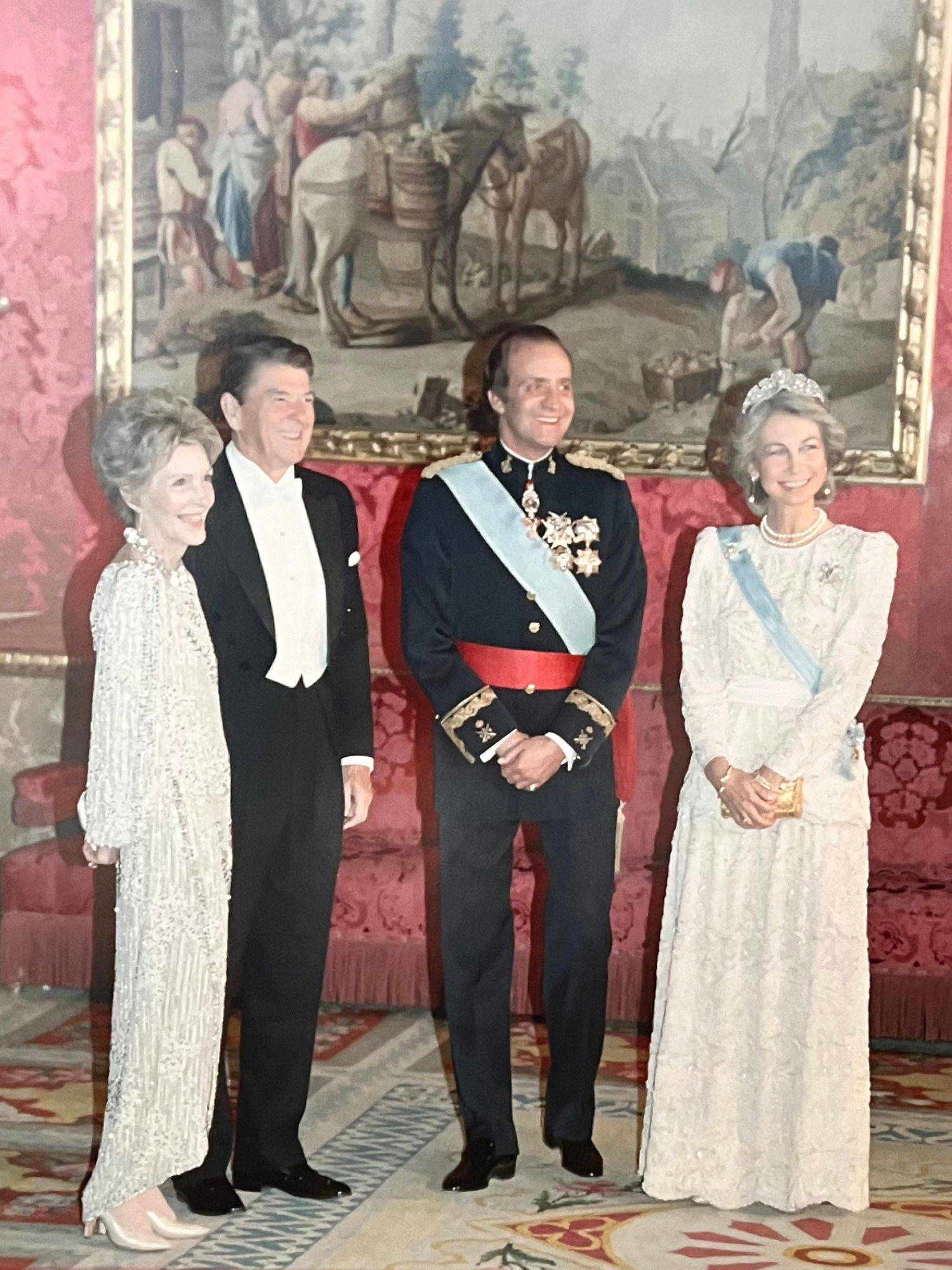
President Reagan's State visit to Spain, meeting with President Gonzalez, and King Juan Carlos I, and Queen Sofia. President Reagan and Mrs. Reagan at Zarzuela Palace, Madrid.
Reagan's Daily DiaryTuesday, May 7, 1985
Nancy off with Queen Sofia for a lunch & a visit to an art school where Nancy was persuaded to join the students in dancing the Flamenco. She made every paper in the world & a lot of magazines.I made a morning speech on free enterprise to about 350 business leaders- some Americans who head up Am. businesses in Spain. The King accompanied me. Then I was into a meeting with Gonzalez and members of the Cabinet & Parliament.
The day was topped off with a State dinner-White tie again. The dinner was in the official Palace which is used for such occasions. All in all it was a good day and a fine relationship exists. The people in the streets were really friendly & enthused.
Key Facts
- President Reagan makes a speech on free enterprise to 350 business leaders in Madrid, Spain.
- President Reagan meets with Prime Minister of Spain Felipe Gonzalez Marquez.
RONALD REAGANToast at the State Dinner in Madrid, SpainMay 7, 1985
Your Majesties, 1985 is a year laden with anniversaries of great historical significance. It was 500 years ago that Christopher Columbus and his son Diego came to Spain seeking support for a voyage of exploration. Much will be said about this as we prepare to celebrate 7 years from now, the quincentennial discovery of the Americas. Yet it's not so much the voyage but rather the decision to make the voyage that we should commemorate.
The skills of the captains and sailors, although vital to success, were less significant than the genius of Columbus and the vision of Queen Isabella. Though beseiged with serious challenges, the Spanish throne overcame the doubters and cynics and thus opened a golden age for Spain and a new chapter in human history.
It gives me great pleasure to be with you this evening to applaud another decision of courage and vision, the decision to chart for Spain a course to democracy. The Spanish Crown played a significant role in this historic turning point as well. Your dedication and ideals, Your Majesties, have earned the respect and gratitude of freedom-loving peoples everywhere.
And since your national journey to freedom began, talented leaders have emerged, and the Spanish people have nobly risen to this occasion. Your Majesty, we know that the President and the other leaders of Spain in and out of government have brought Spain peacefully and, yes, gracefully into the family of democratic nations. The American people admire you, and they admire your great achievements. Having been a republic for 200 years we Americans know full well that the road of freedom is not always easy, yet there is every reason to be optimistic. As Sancho proclaimed in Cervantes' "Don Quixote," "A stout heart breaks bad luck." After seeing your nation make dramatic and fundamental change, remaining ever true to the humane values at the core of representative government, no one can doubt that Spain indeed has a stout heart and that because of it your luck will be good.
Because of the efforts of your generation, Spain is no longer isolated on the Iberia Peninsula but is now a vital and growing influence among the free nations of the world. New doors of opportunity are opening, especially in the area of trade and international investment. During these last 40 years, the Western nations have enjoyed tremendous benefit from a relatively free and open trading system. That's why I'm pleased to see Spain becoming a full partner in the European Community, moving to further open the door of economic cooperation with other free countries.
Your Majesty, we would like to work with Spain to keep international trade open and fair. America believes in free people, free markets, and free trade. Increasing the level of exchange between countries serves the interest of all. Trade and investment create a healthy interdependence between free peoples and expand opportunity and unleash new potential. The benefits of trade have been particularly clear as we've seen a vigorous American economy help serve as an engine for progress, pulling the economies of Europe into better times.
Of course, ultimately, whether a country prospers will depend on its domestic policies. Each nation must follow its own path, but I hope the progress that we've made in the United States might encourage others. Instead of trying to redistribute existing wealth, we've tried to produce more. Instead of imposing more controls and regulations, we've sought to free our peoples entrepreneurial spirit. Instead of channeling more of our resources into bureaucracy, we've sought to expand private investment.
The result has been solid growth and low inflation. Almost 8 million new jobs have been created in the United States in the last 2 years.
Your Majesties, the United States has much for which to be grateful to Spain. Our Southwest was settled by pioneers from your country, and a rich Hispanic heritage is still part of our way of life in my adopted home State of California. Today, as Spain takes its place with the democratic nations, I predict the relationship between our peoples will grow and bear fruit as never before.
One of the reasons for my visit to the European Continent is to commemorate the end of the Second World War, that monstrous conflagration that engulfed much of the world. It would be easy to talk in times like this of the heroism of battle and the sacrifice of those who died. Well, instead I've tried to mark this as an anniversary of the beginning of 40 years of peace. For free people, peace is the most precious possession, second only to the preservation of their own liberty. Peace magnifies the joys and meaning of life; it permits the resources of a country to be directed to those productive endeavors that add to well-being and happiness. Everyone is better off when the blessings of peace are enjoyed by a free people. As Cervantes said, "When God sends the dawn, He sends it for all."
But peace doesn't happen on its own. All free people share the responsibility of maturing it, nurturing it, investing in it, taking careful thought, and doing what is necessary to preserve it.
As is fitting, the choice about Spain's contribution to Western security is wholly in Spain's hands. Your decision will be respected. I would say only that the people of the United States would be proud to have the people of Spain continue to stand beside us and the other members of the alliance in our collective, noble effort to preserve the peace and protect human liberty. We believe the peace can and will be preserved by the collective strength of the Western democracies. And if we're strong, we need not be afraid to negotiate with any potential adversary.
The United States is now engaged in arms talks in Geneva. We're seeking not just arms control but an actual reduction in the level of nuclear arsenals. I'm pleased to note that Spain is part of the Western efforts in Stockholm to negotiate a lessening of the tensions between East and West.
The United States is also moving forward on a research project that could use new technologies to diminish the threat of nuclear missiles and lead mankind into a happier and safer time. Our Strategic Defense Initiative is aimed at finding new means for deterring war. It's not based on the threat of nuclear retaliation, but on the contribution of a nonnuclear defense system that would be capable of destroying missiles and incapable of threatening people. By making missiles less of a threat, we hope to make them easier to give up and thus make arms reduction agreements more likely.
Ortega y Gasset once wrote, "Nations are formed and are kept alive by the fact that they have a program for tomorrow." Well, the program for the future of the Western democracies is peace, progress, and freedom.
Today Spain is moving forward in a voyage of freedom and democracy, every bit as courageous as that of Columbus. Spain can be confident of the outcome because the future is on the side of the free. Things that are today beyond the imagination of dictators and tyrants will be conceived of and made reality by free men and women. This we can count on. It is when people can speak and pray, work for themselves, live without fear of repression that the most potent force on this planet is energized -- the genius and power of free people under God.
Your Majesties, today let us be grateful for that love of liberty deeply rooted in the soul of our people. Yes, its fire will light the way to a future more glorious than the golden age of yesteryear. We're building a new world of peace, progress, and freedom.
And I now ask all of you to join me in a toast to His Majesty the King and to the people of Spain, all champions of democracy.
NOTEThe President spoke at 10:48 p.m. at the Royal Palace in response to a toast by King Juan Carlos I. The following day, the President traveled to Strasbourg, France.
WIKIPEDIAThe Kingdom of Spain
A country located in Southwestern Europe, with parts of its territory in the Atlantic Ocean, the Mediterranean Sea and Africa. It is the largest country in Southern Europe and the fourth-most populous European Union member state. Spanning across the majority of the Iberian Peninsula, its territory also includes the Canary Islands in the Atlantic Ocean, the Balearic Islands in the Mediterranean Sea, and the autonomous cities of Ceuta and Melilla in Africa. Spain is bordered to the north by France, Andorra, and the Bay of Biscay; to the east by the Mediterranean Sea; to the south by Morocco in Ceuta and Melilla, and the United Kingdom in Gibraltar; and to the west by Portugal and the Atlantic Ocean. Spain's capital and largest city is Madrid; other major urban areas include Barcelona, Valencia, Zaragoza, Seville, Malaga, Murcia, Palma de Mallorca, Las Palmas de Gran Canaria, and Bilbao.Spain is a Western country and one of the major Latin countries of Europe, and a cultural superpower. Spanish culture is marked by strong historic ties to the Catholic Church, which played a pivotal role in the country's formation and subsequent identity. Spanish art, architecture, cuisine, and music have been shaped by successive waves of foreign invaders, as well as by the country's Mediterranean climate and geography. The centuries-long colonial era globalised Spanish language and culture, with Spain also absorbing the cultural and commercial products of its diverse empire.
In early antiquity, the Iberian Peninsula was inhabited by a mixture of Iberian and Celtic tribes, along with other local pre-Roman peoples. With the Roman conquest of the Iberian Peninsula, the province of Hispania was established. Following the Romanization and Christianization of Hispania, the fall of the Western Roman Empire ushered in the inward migration of tribes from Central Europe, including the Visigoths, who formed the Visigothic Kingdom centred on Toledo. In the early eighth century, most of the peninsula was conquered by the Umayyad Caliphate, and during early Islamic rule, Al-Andalus became a dominant peninsular power centered in Cordoba. Several Christian kingdoms emerged in Northern Iberia, chief among them Asturias, Leon, Castile, Aragon, Navarre, and Portugal; made an intermittent southward military expansion, known as the Reconquista, repelling Islamic rule in Iberia, which culminated with the Christian seizure of the Nasrid Kingdom of Granada in 1492. The dynastic union of the Crown of Castile and the Crown of Aragon in 1479 is often considered the formation of Spain as a country.
During the Age of Discovery, Spain formed one of the largest empires in history; it extended across the Atlantic to the Americas and across the Pacific to the Philippine Islands. The empire's need for financing and the transatlantic trade underpinned the rise of a global trading system fueled primarily by precious metals, and the reforms of the Bourbon in the 18th century centralized mainland Spain. In the 19th century, despite the victory in the Peninsular War, the following political divisions between liberals and absolutists eventually led to the independence of most of its American colonies. Political instability reached its peak in the 20th century with the Spanish Civil War, giving rise to the Francoist dictatorship that lasted until 1975. With the restoration of democracy under the Constitution of Spain and its entry into the European Union, the country experienced an economic boom that profoundly transformed it socially and politically. Since the Siglo de Oro, Spanish art, architecture, music, poetry, painting, literature, and cuisine have been influential worldwide, particularly in Western Europe and the Americas.
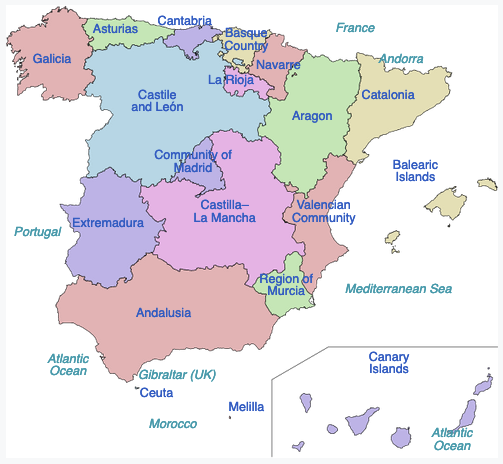
- Spain is a diverse country made up of several different regions with varying economic and social structures, as well as different languages and historical, political and cultural traditions. There are 17 autonomous communities and two autonomous cities (Ceuta and Melilla) that are collectively known as "autonomies" or regions.
- As a reflection of its large cultural wealth, Spain has one of the world's largest numbers of World Heritage Sites.
- It is the world's second-most visited country and the most popular destination for Erasmus students.
- Its cultural influence extends to over 600 million Hispanophones, making Spanish the world's second-most spoken native language and the world's most widely spoken Romance language.
- Spain is a secular parliamentary democracy and a constitutional monarchy, with King Felipe VI as head of state.
- It is a major advanced capitalist economy, with the world's fifteenth-largest economy by nominal GDP (fourth of the European Union) and the fifteenth-largest by PPP.
- Spain is a member of the United Nations, the European Union, the eurozone, North Atlantic Treaty Organization (NATO), a permanent guest of the G20, and is part of many other international organizations such as the Council of Europe (CoE), the Organization of Ibero-American States (OEI), the Union for the Mediterranean, the Organisation for Economic Co-operation and Development (OECD), the Organization for Security and Co-operation in Europe (OSCE), and the World Trade Organization (WTO).
- Spain also includes the Balearic Islands in the Mediterranean Sea, the Canary Islands in the Atlantic Ocean and a number of uninhabited islands on the Mediterranean side of the Strait of Gibraltar, known as plazas de soberania ("places of sovereignty", or territories under Spanish sovereignty), such as the Chafarinas Islands and Alhucemas.
- Mainland Spain is a rather mountainous landmass, dominated by high plateaus and mountain chains.
- Spain's capitalist mixed economy is the 14th largest worldwide and the 4th largest in the European Union, as well as the eurozone's 4th largest. Since the 1990s some Spanish companies have gained multinational status, often expanding their activities in culturally close Latin America. Spain is the second biggest foreign investor there, after the United States.
- The automotive industry in Spain is one of the largest employers in the country. In 2015 Spain was the 8th largest automobile producer country in the world and still in 2022 the 2nd largest car manufacturer in Europe after Germany.
- In 2017, Spain was the second most visited country in the world, recording 82 million tourists which marked the fifth consecutive year of record-beating numbers. The headquarters of the World Tourism Organization are located in Madrid.
- In 2019, the population of Spain officially reached 47 million people. Native Spaniards make up 88% of the total population of Spain.
- Spanish-featured in the 1978 Spanish Constitution as castellano ('Castilian')-has effectively been the official language of the entire country since 1931. Spanish is natively spoken by 74%, Catalan by 17%, Galician by 7% and Basque by 2% of the Spanish population.
- Roman Catholicism, which has a long history in Spain, remains the dominant religion.
- The most popular traditional musical instrument, the guitar, originated in Spain. Typical of the north are the traditional bag pipers or gaiteros, mainly in Asturias and Galicia.
- Sport in Spain has been dominated by football since the early 20th century. Varieties of football have been played in Spain as far back as Roman times. Basketball, tennis, cycling, handball, futsal, motorcycling and, lately, Formula One also can boast of Spanish champions. Today, Spain is a major world sports powerhouse, especially since the 1992 Summer Olympics and Paralympics that were hosted in Barcelona, which stimulated a great deal of interest in sports in the country. The tourism industry has led to an improvement in sports infrastructure, especially for water sports, golf and skiing.
EtymologyThe name of Spain (Espana) comes from Hispania, the name used by the Romans for the Iberian Peninsula and its provinces during the Roman Empire. The etymological origin of the term Hispania is uncertain, although the Phoenicians referred to the region as Spania (meaning "Land of rabbits"), therefore, the most accepted theory is the Phoenician one.
















